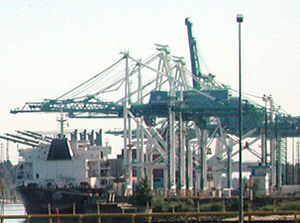- Home
- News
- Features
- Topics
- Labor
- Management
- Opinions/Blogs
- Tools & Resources
Court Rules In Union Vs. Union Dispute In Oregon
By ROBERT THOMAS— The International Longshore and Warehouse Union (ILWU) wants to make sure they aren’t left out of the cold at the Port of Portland Oregon.
The union has been filing lawsuits and grievances against the International Brotherhood of Electrical Workers (IBEW) in a dispute about who has the legal contract to plug in, unplug and monitor refrigerated shipping containers.
The fight began in March 2012 when ILWU workers allegedly attempted to circumvent the IBEW contract with International Container Terminal Services Inc. (ICTSI), a shipping company operating out of the Port of Portland.
In August 2012, the National Labor Relations Board determined that employees represented by the IBEW were entitled to the work.
“[The ruling] simply means that the same people who have been doing the work since 1974 will continue to do it,” IBEW spokesman Norman Malbin, told the Washington Free Beacon.
Despite the ruling, the ILWU continued to file grievances seeking lost wages for work assigned to them. The union also filed a claim in the dispute in federal court under the Labor-Management Relations Act.
Federal Judge Rules Against Longshore Union
In granting the petition for injunctive relief from the NLRB’s Seattle office, the judge found that the ILWU had the unlawful secondary objective of pressuring shipping carriers to cease doing business with the Port of Portland.
Even a task as simple as plugging and unplugging containers can mean more workers for an individual union and additional hours for its members. The IBEW and ILWU are members of the AFL-CIO, however more workers for a particular union serves to extend their influence.
Steve Allen, a labor expert with the Capital Research Center, says that union workers may put up a united front politically but often have little in common at the local level. Each union is trying to maximize wages and benefits for its members, he said.
“A major part of the history of the union movement has been that people fight over turf even within a union federation,” Allen told the Washington Free Beacon.
Malbin acknowledged that labor conflicts are inevitable at times, especially when members are confined to a fixed workplace, such as a port.
“Unfortunately, jurisdictional disputes between unions is something that seems to happen on a periodic basis,” he said.
List your business in the premium web directory for free This website is listed under Human Resources Directory





